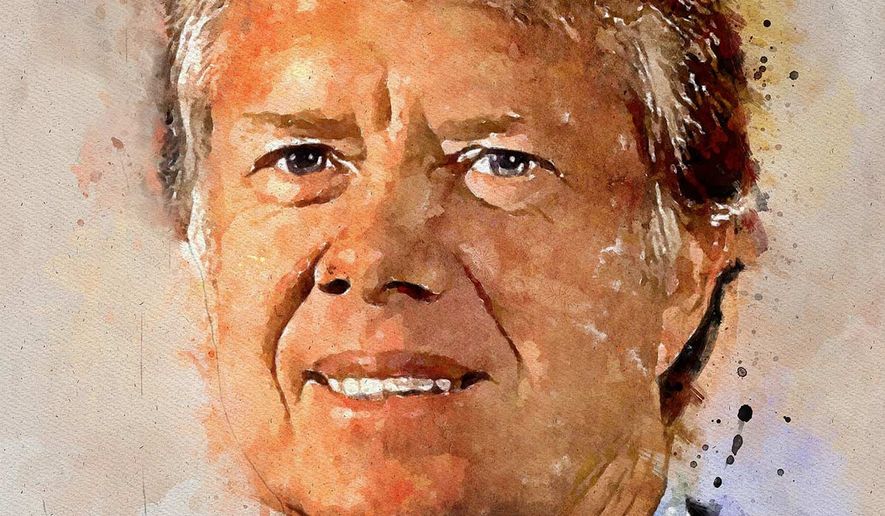OPINION:
For America’s 39th president, a long earthly journey is nearing its end. “Hail to the Chief” was last played in his honor 42 years ago. Soon, it will be played once more in tribute to his service. Jimmy Carter’s story should inform our thinking as we face at once a generational change in our politics and a crisis of leadership.
The presidency of the peanut farmer from Plains, Georgia, was borne out of Americans’ exhaustion over Vietnam, Watergate and by some measure, the urban decay and moral corrosion that were hallmarks of our country in the 1970s. His presidency was widely associated with national malaise, a word he never said but seemed unable to shake, with an approach to governing that could be described as tepid or even naive.
But his post-presidency was marked by a quiet service to Creation that often went unseen.
You may have disagreed with Mr. Carter’s policy positions, but unlike today’s left-wing Democrats, his decision-making did not come from a desire to expand his or his party’s dominion and control over others. His wasn’t a brutish approach.
Mr. Carter looked at life and leadership through the lens of a biblical worldview, something lost on many Democrats who have abandoned that truth for moral relativism and the religion of the state.
Unlike the Obamas, who live high on the hog inking their Netflix and book deals worth tens of millions, Mr. Carter was no sellout. Unlike the Clintons, who established a nonprofit that became embroiled in scandal over its alleged use of funds to help finance a lavish lifestyle rather than improve lives, Mr. Carter served others rather than himself.
Perhaps his greatest lesson for America’s next generation of leaders, for it is certainly lost on the current lot, is that the truest measure of leadership is how you act and what you do when the cameras are off.
In that regard, the one-term President Carter was a giant.
For those in both parties who exploit tragedy and calamity for political gain, who are attracted to cameras like a moth to a flame, embracing Mr. Carter’s approach would help restore some measure of confidence in our system.
Mr. Carter never lived a solid-gold lifestyle. He still lives with Rosalynn, his first wife (of 76 years, imagine that), in the small house he bought decades ago. In 2018, it was valued at $168,000 — less than the cost of the Secret Service vehicles parked out front.
Mr. Carter never sought to cash in, lend his name to corporate boards or sell NFTs. He never fell into the trap of the idolatry of fame.
He walked to church well into his 90s. When he became involved with Habitat for Humanity, he didn’t do it to make a buck. For decades he picked up a hammer, carried lumber and labored alongside families who would one day make that wood frame a home.
You can’t imagine Presidents Biden, Barack Obama or Donald Trump covered in sawdust, hauling lumber or digging a foundation unless they were being followed by a bevy of reporters.
Mr. Carter chose humility rather than hubris as a road map for living. Real leaders do the same. Perhaps he remembered the passage from Matthew’s Gospel that says, “And whosoever shall exalt himself shall be abased.”
Our leaders today are too staged, managed, contrived and self-interested. They enjoy the trappings of office more than the impact they can have when handed a public charge. They don’t even try to hide it anymore.
Americans should ask what their leaders do when no one is watching, whether they give to charity, whether they help others quietly, and how they approach their relationship with God and their family.
All of these things go to issues of character — and character matters.
The presidency is a noble and often lonely institution, and America’s presidents should be comfortable with both of those attributes.
As a Christian, Mr. Carter believed that this life is transitory and altogether a preparation for the next one. His approach wasn’t self-centered or aggrandizing in a way that has become the hallmark of our celebrity politicians, who, in many ways, are so big yet so small.
Mr. Carter and George H.W. Bush came from a bygone era when former presidents didn’t seek to recapture their former glory. They accepted the judgment of the people and of history. They understood the responsibility of leadership continued, but it would change in tone and in character.
As we prepare to bid Mr. Carter farewell, we would all do well to learn a thing or two, perhaps not from his record but from the life that he has lived beyond the walls of the White House.
• Tom Basile is the host of “America Right Now” on Newsmax TV, an author and a former George W. Bush administration official.




Please read our comment policy before commenting.